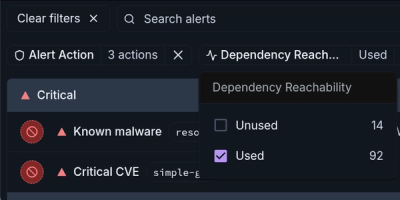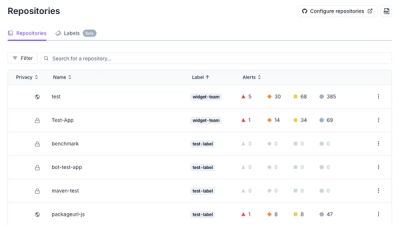
Product
Introducing Module Reachability: Focus on the Vulnerabilities That Matter
Module Reachability filters out unreachable CVEs so you can focus on vulnerabilities that actually matter to your application.
Fast fuzzy string matching for Python.
pip install ffzf
# Find closest string matching
from ffzf import closest
best_match = closest("hello", ["harps", "apples", "jello"])
# Find n best matches
from ffzf import n_closest
best_matches = n_closest("hello", ["harps", "apples", "jello"], 2)
from ffzf import JAROWINKLER
# Specify an algorithm (default is levenshtein distance)
best_match = closest("hello", ["harps", "apples", "jello"], algorithm=JAROWINKLER)
# Call algorithm directly
from ffzf import levenshtein_distance
dist = levenshtein_distance("hello", "jello")
# Case sensitive comparison (default is case insensitive)
dist = levenshtein_distance("Hello", "hello", case_sensitive=True)
best_match = closest("Hello", ["harps", "apples", "jello"], case_sensitive=True)
# Remove whitespace (default is to keep the whitespace in strings)
dist = levenshtein_distance("hello world", "helloworld", remove_whitespace=True)
# Return scores with closest results
from ffzf import n_closest_with_score
best_matches = n_closest_with_score("hello", ["harps", "apples", "jello"], 2)
FAQs
Unknown package
We found that ffzf demonstrated a healthy version release cadence and project activity because the last version was released less than a year ago. It has 1 open source maintainer collaborating on the project.
Did you know?

Socket for GitHub automatically highlights issues in each pull request and monitors the health of all your open source dependencies. Discover the contents of your packages and block harmful activity before you install or update your dependencies.

Product
Module Reachability filters out unreachable CVEs so you can focus on vulnerabilities that actually matter to your application.

Product
Socket is introducing a new way to organize repositories and apply repository-specific security policies.

Research
Security News
Socket researchers uncovered malicious npm and PyPI packages that steal crypto wallet credentials using Google Analytics and Telegram for exfiltration.